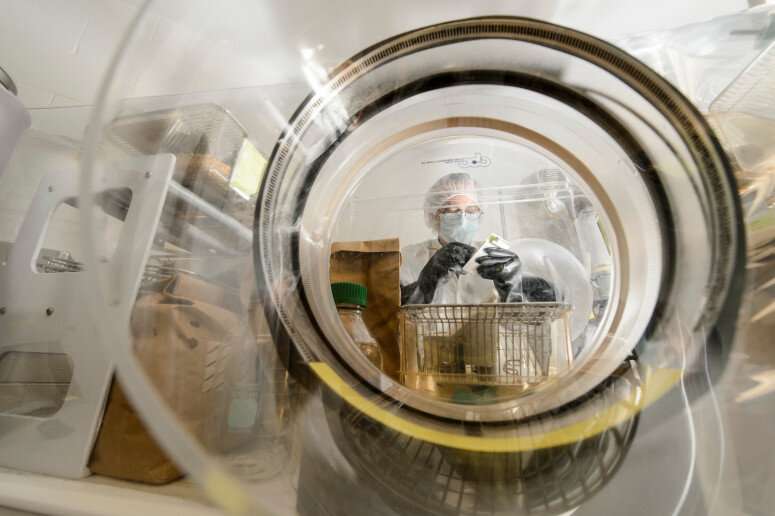This article has been reviewed according to Science X's editorial process and policies. Editors have highlighted the following attributes while ensuring the content's credibility:
fact-checked
peer-reviewed publication
trusted source
proofread
Bacteria with a taste for inflammation could help protect against heart disease

Some microbes in the guts of humans and mice may help control the buildup of plaque in arteries, the leading cause of cardiovascular disease, by gobbling up a group of inflammatory chemicals before they can circulate in the body.
New research from the University of Wisconsin–Madison and collaborators around the world identified bacteria able to break down uric acid in the low-oxygen environment of the intestines and the specific genes that enable the process. They describe a new way in which gut microbes may influence our health and a potential avenue to treat gout or prevent heart disease.
Uric acid is a product of the breakdown in the human body of purines, a class of molecules that include those necessary for life, like adenine and guanine (two of the basic building blocks of DNA), and some that are life indulgences, like caffeine and theobromine (found in chocolate and tea leaves). Most uric acid is cleaned out by healthy kidneys, but about 30% of it spills into the gut. Too much of uric acid leads to a painful condition called gout.
"When your blood is saturated with uric acid, it starts to form crystals that accumulate in the joints and cause gout," says Federico Rey, UW–Madison professor of bacteriology and an author of the new study, which published recently in the journal Cell Host & Microbe. "But before you get enough uric acid to form crystals, even if you have a little bit more uric acid than is normal, it's promoting inflammation in your body that is correlated with atherosclerosis—plaque building up in your arteries."
Rey's lab partnered with researchers in Sweden who analyzed factors including arterial plaque, uric acid levels and microbial communities in the digestive tract in a group of nearly 1,000 people. The amount of uric acid in their bodies ran hand-in-hand with the amount of fats, cholesterol and other stuff calcifying their arteries.
"Uric acid levels also correlate with the patterns of different bacteria present in the gut of these people," says Rey. "So, we wanted to know if we could identify the types of bacteria that were associated with lower uric acid and see whether they are associated with lower atherosclerosis."
The UW–Madison researchers—including former postdoctoral researcher Kazuyuki Kasahara, scientist Robert Kerby and graduate student Qijun Zhang—performed fecal transplants to move gut microbes from mature mice to mice born with microbe-free digestive tracts. Artery health passed along with the poop. Mice who received microbes from donors with plaque-heavy arteries and higher levels of uric acid in their blood developed the same conditions. Mice who received microbes from donors with less uric acid and clearer blood vessels were similarly lower in both measures.
The researchers began identifying the microbes associated with healthy outcomes, monitoring the genes that were particularly active when the bacteria were grown on uric acid.
"That led us to a cluster of genes, found across many different types of bacteria, necessary to break down purines and uric acid in the intestine," says Rey, whose work is supported by the National Institutes of Health. "When these purine-degrading microbes were using uric acid in the gut for their own needs there was less uric acid present in the blood of mice."
Rey would next like to explore whether introducing these purine-eating bacteria to animals with arterial plaque issues can correct their cardiovascular disease, but for now, he says the researchers have a genetic marker of uric acid breakdown in the gut.
"They're not exotic bacteria. We discovered that these genes needed to break down uric acid were present in microbes we already had in the lab and could grow easily," says Rey. "It's very premature to say introducing them in people could help them with cardiovascular disease or even gout. But we have a new understanding of one way the gut microbiome modulates the abundance of this inflammatory compound, and that may point the way to new treatments."
More information: Kazuyuki Kasahara et al, Gut bacterial metabolism contributes to host global purine homeostasis, Cell Host & Microbe (2023). DOI: 10.1016/j.chom.2023.05.011



















